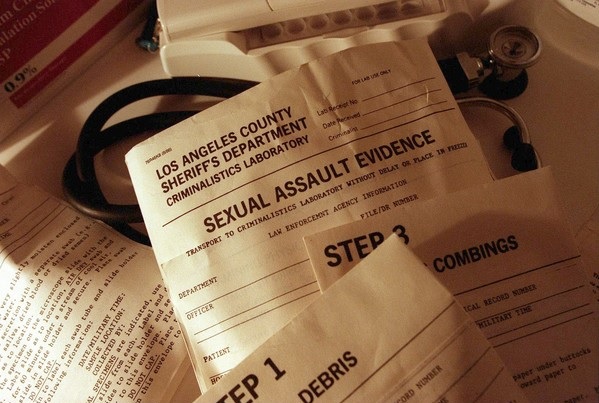[captionpix imgsrc=”https://pvnn.org/wp-content/uploads/2015/10/mikerape.jpg” captiontext=”Photo courtesy of articles.latimes.com”]
Rape is among the most difficult crimes to prosecute. This is because the American justice system requires a “beyond a reasonable doubt” standard to convict a defendant. In many rape cases, the only witnesses are the victim and the defendant. These investigations often result in he said/ she said arguments that do not sway a jury to convict. The question is, then, how can we bring justice to rape victims while working within the American justice system?
Like many other crimes, DNA evidence assists in the prosecution of an accused rapist. Following a sexual assault, a trained professional collects DNA evidence that may have been left by the suspect. The rape kit is filled with tools that may be used by the examiner for evidence collection during a forensic medical exam.[ref]”What Is a Rape Kit?” RAINN | Rape, Abuse and Incest National Network, Sept. 19, 2015.[/ref] The evidence collected in the kit can be used to prosecute accused rapists and assemble a national database of individuals that have committed sexual assault. This information allows law enforcement to identify serial rapists. For example, Detroit initiated the “Sexual Assault Kit Evidence Submission Act,” and tested all of their 11,341 kits, resulting in 1,476 DNA matches and the identification of 326 potential serial rapists.[ref] “Why Testing Matters,” Sept. 19, 2015.[/ref]
In the past several years, many rape kits have been collected, but the majority are in storage at police stations instead of being processed. This has resulted in backlogs of rape kits stored around the country. There are 400,000 untested rape kits throughout the United States.[ref]Soraya Chemaly, “How Many of the Hundreds of Thousands of Untested Rape Kits in the US Are in Your City?” The Huffington Post, Sept. 19, 2014.[/ref] Though police are expected to send critical evidence to a crime lab, DNA analysis is expensive, and in many cases, the person accused of the rape is known or the victim may recant the story and not want the case to be prosecuted. This is why many kits have not been analyzed. Recently, a national movement has arisen urging states to test the kits in storage. Different states are in different stages of the process. Colorado, Illinois, Ohio, and Texas have enacted legislation to test their rape kit backlogs. Washington, California, Utah, Minnesota, Arkansas, Louisiana, Michigan, Kentucky, Tennessee, Virginia, Maryland, and Delaware have all passed legislation to audit their untested rape kit backlogs. Other states either have not taken any actions to address this issue or their legislatures have proposed legislation that would audit their backlogs.[ref] “Where the Backlog Exists.” Sept. 19, 2015.[/ref] States that have tested their backlogs have identified serial rapists. After police in Fort Worth, Texas, began clearing their backlog of 960 untested kits in 2003, they received more than 200 DNA matches, leading to 47 arrests, 36 felony convictions and the apprehension of five serial rapists.[ref]”Why Testing Matters.” Sept. 19, 2015.[/ref] Similarly, in Cleveland, the testing of approximately 2,300 kits resulted in 968 DNA matches, 324 investigations and 209 criminal indictments.[ref]Ibid[/ref]
Rape kit DNA analysis costs between $1,000 and $1,500 per kit. Since most states’ backlogs contain more than one thousand kits, this will be an expensive undertaking. Some have argued that only certain kits needed for active cases where the identity of the attacker is disputed should be tested. Others believe that testing kits that are not necessary for specific prosecutions is wasting resources that could be used on other issues, such as homicide investigations or other government programs.[ref]Snow, Kate, and Rich McHugh, “Why Haven’t 70,000 Rape Kits Been Tested for DNA?” NBC News. July 20, 2015, accessed on Sept. 19, 2015.[/ref] However, testing all of the rape kits would allow the federal government to assemble a catalog of offenders that would help law enforcement to identify serial rapists. It is encouraged to test of all rape kits that have been collected.
The Obama Administration established the Sexual Assault Kit Initiative in March 2015, which is investing $41 million to help the states accelerate the testing of their rape kit backlogs. States can ask for grants from the Federal government to subsidize the testing of their backlogs.[ref]Josh Earnest, “FACT SHEET: Investments to Reduce the National Rape Kit Backlog and Combat Violence against Women,” The White House, Mar. 16, 2015, accessed on Sept. 19, 2015.[/ref] Vice President Biden, who supported the Violence Against Women Act in 1994, spearheads this initiative. The Sexual Assault Kit Initiative is a renewal of the Debbie Smith Act, which was signed into law by President George W. Bush in 2004. Debbie Smith, who is a leading advocate for testing rape kits, was the victim of a sexual assault in 1989. Her kit was tested in the 1990s, leading to the conviction of a man accused of sexual assault by two other women.
Rape is a violent crime that has both financial and emotional consequences for the victims. While the exact toll of the crime is difficult to calculate, the arrest and conviction of sexual offenders will prevent future criminal acts limiting future cost to both individuals and the state. Testing the rape kit backlog can help prosecute rape offenders, bring justice to the victims, and lower the rate of this crime.
Take Action:
Check out “End the Backlog,” a non-profit organization dedicated to test the Rape Kit Backlog, in hopes of bringing justice to rape victims.



